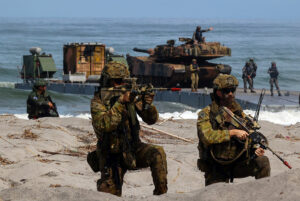Philippine defense spending and its impact on economic growth

POPULAR ECONOMIC wisdom has it that defense spending and economic growth do not go together. That an investment in the former will likely lead to deceleration in the other. Hence the usual view towards education, infrastructure, and even welfare as the rather “good” type of spending that will lead to economic growth.
Indeed, there have been studies that seem to bolster that school of thought: One of the earliest papers on such done in the Philippines was written by Frederiksen and LaCivita (1987), which declared that “causality runs from economic growth to defense spending and not the other way around.” Several similar papers, such as Deger and Sen’s (1989) study saw defense spending as decreasing or halting parts of a country’s economy; while Azam (a 2020 study on low-income countries’ defense budget) and Sampson (a 2022 study on different income-level countries’ approach towards defense and the economy) indicate that any positive relationship between defense spending and economic growth is — at best — weak.
Nonetheless, at least for substantially many of the studies made on the subject, what is notable is how such usually involve discussions on politically unstable low-income countries, many of these States coming from the Middle East and North Africa, whose defense spending is regarded as retarding economic growth due to the overly protracted conflicts within those areas. Azam (2020) explains that: “Generally, it is believed that in the insecure region, each country deliberately allocates an uneven share of its meager economic resources to ‘unproductive’ military expenditure. In the absenteeism of international collaboration to minimize political pressure, military expenditures can be driven more and more across a region as each country goes beyond its neighbors to safeguard its security, raise the level of regional military expenditure and bring little rise or even a decline in the security of all.”
What is interesting is that even for an infinitely richer country such as the US, the relationship between economic growth and defense expenditure is still one that is seemingly unsustainable. A RAND Corp. study (2021) finds that: “Although reducing defense spending will not, on its own, bring about balanced budgets, supporters of a smaller defense budget believe that reductions could have a meaningful impact on the annual federal budget and US public debt. Furthermore, they argue that increasing taxes to maintain or increase defense spending would hurt economic growth, because they believe that private spending is more beneficial for the US economy.” This situation could be attributed to the US’ economy being then at a somewhat muscular state, which means that no matter how much money you throw into the pool, it would not make a difference to economic growth at a microeconomic scale.
And yet, what about the Philippines? Is it really necessary for our country to make a choice in bifurcated terms between defense spending and economic growth? Are they really diametrically opposed to each other as many previous studies have declared? This is crucial considering the social and economic issues that the Philippines needs to confront amidst an ongoing complex geopolitical context within which defense of our national territory is set.
My study, “The Implications of Defense Expenditure on Philippine Economic Growth,” sought to answer the question on how significant the relationship is between Philippine defense spending and its economic growth. By using a regression analysis of the Department of National Defense’s (DND) budget vis-à-vis the country’s GDP for a nearly 20-year period (from 2000 to 2019), it was found that for every 1% increase in defense expenditure there results an estimated increase of 0.12% in GDP.
Consequently, it may be more imperative for the Philippines to allow the Defense department greater flexibility in terms of budget allocation due to its possible multi-dimensional effect, particularly the geopolitical, economic, social, and cultural dimensions of the Philippines. This, coincidentally, is similarly indicated in the aims pointed out in the National Security Policy of 2023 to 2028 and the Philippine Development Plan of 2023 to 2028. Investing in the defense sector should be seen more and more not merely as a purely national security matter but also as a positive catalyst in sustaining or facilitating the country’s economic growth.
Unfortunately, the Philippines is not able to fully exploit its potential military capabilities given its comparatively lackluster funding. As it stands, the Defense department is usually around fifth in terms of government budget allocation, with the top positions usually being held by the Departments of Education, Public Works and Highways, and Health. In turn, the Stockholm International Peace Institute ranked the Philippines 7th out of the 10 ASEAN member states in military spending in 2019.
Defense spending in the Philippines accounted for an average of 1.06% from 2011 to 2021 in the country’s GDP. The World Bank stated that the contribution average of military spending of the Philippines is 1.21% lower in comparison to the world’s contribution to global GDP. As a possible consequence of this, the Philippines’ funding and spending distribution within the DND inadequately supports its sub-sectors and military forces, such as the Philippine Navy or the Philippine Air Force. This lukewarm financial condition should be disconcerting considering ongoing Chinese hostility in the West Philippine Sea. And yet, the effects of that dispute with China go beyond who exercises sovereignty over what territory but also consequences to national employment, economic productivity, and even food security.
The shifting of our policy focus towards national security will not only protect Philippine sovereignty but also positively contribute to the economic development of our people. By protecting our borders from foreign aggressors, food security and raw material supply can be secured. President Ferdinand Marcos, Jr. should thus be assured that his prioritizing increased military capability is a step in the right direction. Indeed, education, infrastructure, and health are important and, yes, constitutionally the “State shall assign the highest budgetary priority to education,” but this point could never be emphasized enough: defense spending, at this particular juncture in our nation’s history, should already be considered as an existential necessity.
Rocio Salle-Gatdula is a master of Industrial Economics graduate of the University of Asia and the Pacific. Her study, “The Implications of Defense Expenditure on Philippine Economic Growth,” will be published in book form soon.




